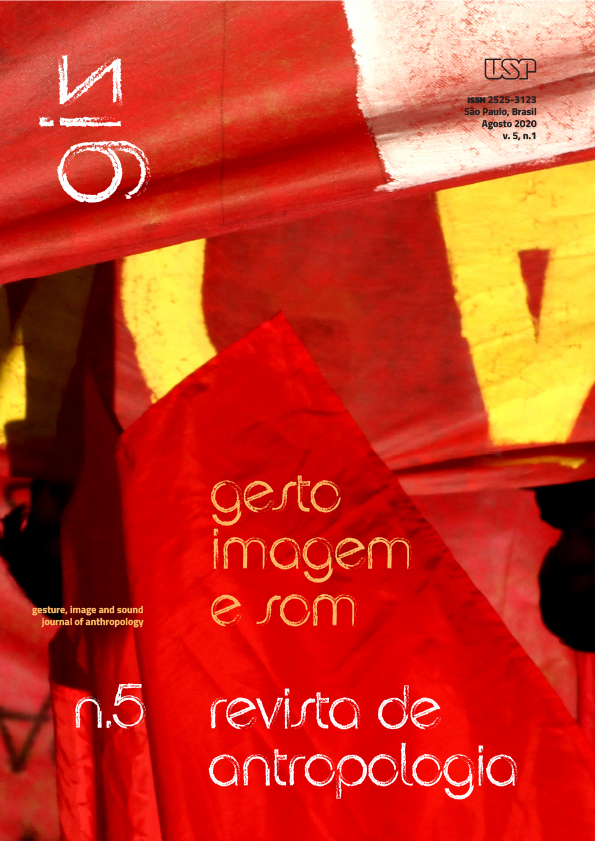O antropólogo-cineasta e o nativo-a(u)tor: as transformações de Oumarou Ganda e Petit Touré em Eu, um negro, de Jean Rouch
DOI:
https://doi.org/10.11606/issn.2525-3123.gis.2020.165057Palavras-chave:
Jean Rouch, Performance, Corpo, Nativo, AutorResumo
Este artigo apresenta a dimensão performática e corporal das personagens de Oumarou Ganda e Petit Touré no filme Eu, um negro, de Jean Rouch (1958). Para além da análise dos enquadramentos, falas e edição, enseja-se dar ênfase à interpretação da dimensão performática, tanto dos gestos corporais e feições faciais quanto da impostação da voz off de Oumarou Ganda e Petit Touré. Se, por um lado, compreender de que maneira a dimensão performática e corporal de Ganda e Touré cria uma mise-en-scène própria, possibilitando pensá-los como nativo-a(u)tores, por outro, analisar o espaço de criação das personagens traz apontamentos para pensar na construção do conhecimento antropológico a partir da relação entre Rouch e seus interlocutores.
Downloads
Referências
Arnheim, Rudolf. 1957. Film as art. Berkeley: University of California Press.
Baron, Cynthia and Sharon Marie Carnicke. 2008. Reframing screen performance. Ann Arbor: University of Michigan Press.
Bazin, André. 2006. Orson Welles. Rio de Janeiro: Zahar.
Bazin, André. 2018. O que é o cinema? São Paulo: Ubu.
Benjamin, Walter. 1987. A obra de arte na época de sua reprodutibilidade técnica. In Magia, técnica, arte e política: ensaios sobre literatura e história da cultura, Walter Benjamin, 167-196. São Paulo: Brasiliense.
Bhabha, Homi. 2007. O local da cultura. Belo Horizonte: Ed. UFMG.
Boudreault-Founier, Alexandrine, Rose Satiko Gitirana Hikiji e Sylvia Caiuby Novaes. 2016. Etnoficção: uma ponte entre fronteiras. In A experiência da imagem na etnografia, ed. Andrea Barbosa, Edgar Teodoro da Cunha, Rose Satiko Gitirana Hikiji e Sylvia Caiuby Novaes, 37-58. São Paulo: Terceiro Nome.
Deleuze, Gilles e Claire Parnet. 1998. Diálogos. São Paulo: Escuta.
Eisenstein, Sergei.1957. The film sense. New York: Meridian Books.
Ferraz, Ana Lúcia M. C. 2013. Dramaturgia da vida social e a dimensão patética da pesquisa antropológica: o cinema de Jean Rouch e a prática de realização de filmes etnográficos. In Antropologia e performance: ensaios Napedra, org. John Cowart Dawsey, Rose Satiko Gitirana Hijiki, Marianna Monteiro e Regina Polo Muller, 323-338. São Paulo: Terceiro Nome.
Gonçalves, Marco Antonio. 2008. O real imaginado: etnografia, cinema e surrealismo em Jean Rouch. Rio de Janeiro: Topbooks.
Grimshaw, Anna. 2001. The ethnographer’s eye: ways of seeing in anthropology. Cambridge: Cambridge University Press.
Hall, Stuart, org. 1997. Representation: cultural representation and signifying practices. London: Sage.
Henley, Paul. 2009. The adventure of the Real: Jean Rouch and the Craft of Ethnographic Cinema. Chicago, London: University of Chicago Press.
Hirano, Luis Felipe Kojima. 2019. Grande Otelo: um intérprete do cinema e do racismo no Brasil (1917-1993). Belo Horizonte: Ed. UFMG.
Hirano, Luis Felipe Kojima. 2013. O imaginário da branquitude à luz da trajetória de Grande Otelo: raça, persona e estereótipo em sua perfomance artística. Afro-Ásia, no. 48: 77-125. http://dx.doi.org/10.1590/S0002-05912013000200003.
Ingold, Tim. 2007. Lines. London: Routledge.
Ingold, Tim. 2015. The life of lines. London: Routledge.
King, Barry. 1985. Articulating Stardom. Screen, vol. 26, no. 5: 27-50.
Kuleshov, Lev. 1974. Kuleshov on film: writings of Lev Kuleshov. Los Angeles: University of California Press.
Lotierzo, Tatiana. 2019. Erosão num pedaço de papel. Tese de doutorado, Universidade de Brasília, Brasília.
Marcus, George. 1991. Identidades passadas, presentes e emergentes: requisitos para etnografias sobre a modernidade no final do século XX ao nível mundial. Revista de Antropologia, vol. 34: 197-221. https://doi.org/10.11606/2179-0892.ra.1991.111301.
Mauss, Marcel. 1934/2003. As técnicas do corpo. In: Ensaios de sociologia e antropologia. São Paulo: Cosac Naify.
Piault, Marc-Henri.1997. Uma antropologia-diálogo: a propósito do filme de Jean Rouch, Moi, un noir. Cadernos de Antropologia e Imagem, no. 4: 185-192.
Pirandello, Luigi. 1925. On tour. Paris: Sagittaire.
Stam, Robert e Ella Shohat. 2006. Crítica da imagem eurocêntrica. São Paulo: Cosac Naify.
Strathern, Marilyn. 2013. Fora de contexto. São Paulo: Terceiro Nome.
Strathern, Marilyn. 1982. The limits of autoanthropology. In Anthropology at home, ed. Anthony Jackson, 16-37 London: Tavistock Publications.
Sztutman, Renato. 2004. Jean Rouch: um antropólogo-cineasta. In Escrituras da imagem, ed. Sylvia Caiuby Novaes, Andréa Barbosa, Edgar Teodoro da Cunha, Florencia Ferrari, Renato Sztutman e Rose Satiko Gitirana Hikiji, 49-62 São Paulo: Edusp.
Sztutman, Renato. 2005. Imagens perigosas: a possessão e a gênese do cinema de Jean Rouch. Cadernos de Campo, vol. 13, no. 13: 115-124. https://doi.org/10.11606/issn.2316-9133.v13i13p115-124.
Viveiros de Castro, Eduardo. 2002. O nativo relativo. Mana, vol. 8, no. 1: 113-148. https://dx.doi.org/10.1590/S0104-93132002000100005.
Xavier, Ismail. 2005. O discurso cinematográfico. São Paulo: Paz e Terra.
REFERÊNCIAS AUDIOVISUAIS
Ferraz, Ana Lúcia, Edgar Teodoro da Cunha, Paula Morgado e Renato Sztutman. 2000.
Jean Rouch: subvertendo fronteiras. São Paulo, Brasil, NTSC, cor, 41’, DVD.
Kurosawa, Akira. 1954/2004. Os sete samurais. São Paulo, Brasil, Silverscreen, P&B, 207’, DVD.
Rouch, Jean. 1958/2006. Eu, um negro. Rio de Janeiro, Brasil, VideoFilmes, cor, 78’, DVD.
Sturges, John. 1960/2007. The magnificent seven. Los Angeles, EUA, United Artists, P&B, 128’, DVD.
Truffaut, François. 1959/2003. Os incompreendidos. São Paulo, Brasil, MK2, P&B, 100’, DVD.
Downloads
Publicado
Edição
Seção
Licença
Autores que publicam nesta revista concordam com os seguintes termos:
- Autores mantém os direitos autorais e concedem à revista o direito de primeira publicação, com o trabalho simultaneamente licenciado sob a Licença Creative Commons Attribution BY-NC-ND que permite o compartilhamento do trabalho com reconhecimento da autoria e publicação inicial nesta revista para fins não comerciais.
- Autores têm autorização para assumir contratos adicionais separadamente, para distribuição não-exclusiva da versão do trabalho publicada nesta revista (ex.: publicar em repositório institucional ou como capítulo de livro), com reconhecimento de autoria e publicação inicial nesta revista.







